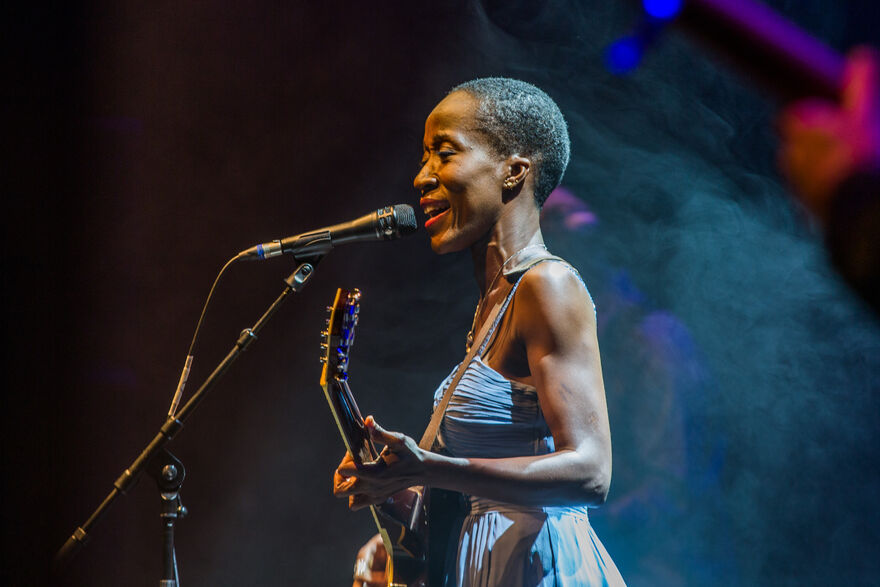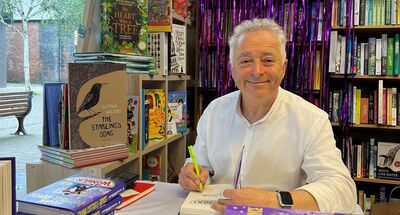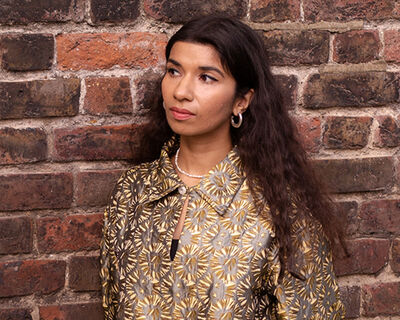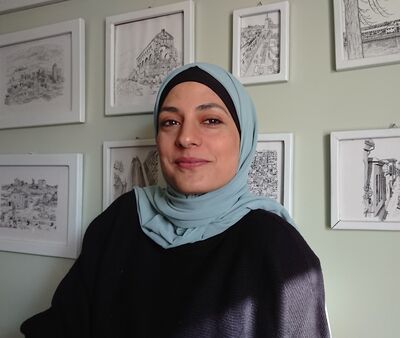
2019: Rokia Traoré
With her work rooted in Malian musical tradition, 2019’s Guest Director was one of Africa’s most inventive musicians
Brighton Festival 2019 Guest Director was Malian singer, songwriter and guitarist Rokia Traoré, who is regarded as one of Africa’s most inventive musicians, with her work rooted in the Malian musical tradition yet defying the confines of a single culture.
Biography
Born in Mali to a diplomat father, Rokia had a nomadic upbringing that exposed her to a wide variety of international musical influences from Ella Fitzgerald, Billie Holiday and Louis Armstrong, to Wagner, Serge Gainsbourg, and the Rolling Stones. Her discography consists of six albums, released between 1998 and 2016
A protégé of the legendary guitarist Ali Farka Touré, Rokia’s breakthrough came in 1997 when she was hailed as the ‘African Revelation’ by Radio France Internationale.
Frequently collaborating with world-renowned artists such as Damon Albarn, Devendra Banhart and the Kronos Quartet, Rokia’s diverse output has also included a number of theatre performances, most notably the acclaimed Desdemona by Toni Morrison, a reimagining of Shakespeare’s Othello directed by Peter Sellars.
A dedicated humanitarian, in 2009 she set up the Foundation Passerelle in support of emerging artists amidst the social crises in Mali.
• Rokia Traoré was born in January 1974 in Kati, on the outskirts of Bamako, the capital of Mali.
• She is the founder and president of the Fondation Passerelle in Bamako, where she lives. Supporting the musical and artistic creation in Mali, it includes an indoor venue, the Blues Faso concert hall, a dance studio, an outdoor space and exhibition spaces, as well as studio apartments to host resident artists and guests. The Foundation organises musical training courses and supports multidisciplinary artistic creations along with talks and debates about Malian society, culture, youth and the challenges they face.
• Rokia Traoré's father, a Bambara from the region of Bélédougou, was a diplomat. She travelled extensively during her youth: Algeria, Saudi Arabia, France and Belgium, where she studied.
• Her identity is deeply rooted in West Africa Mandinka culture. Yet, when Rokia began to learn music, it was easier for her to play guitar and write texts in French or English and dream about rap or rock than participate in weddings during which the traditional griot songs are interpreted. Indeed, being considered a noble Bambara, Rokia Traoré was not deemed to have the right to learn and sing the songs of the griots.
• She composed and recorded her first track in 1995 in Bamako under the artistic direction of the great Ali Farka Touré. Her first single ‘Finini’ was a great success.
• In 1997, she made her debut on a European stage at the festival Musiques Métisses in Angoulême, France. In the same year, she won the ‘Découverte Afrique’ Award from Radio France Internationale (RFI).
• Her first album ‘Mouneïssa’ was released in 1998, followed by a European tour. Two years later, she released her 2nd album ‘Wanita’. She then released ‘Bowmboï’ in 2003, which includes two pieces in collaboration with the American group Kronos Quartet. A world tour followed. That same year, Rokia won an award in the ‘Africa’ category at the BBC Radio 3 World Music Awards.
• Rokia Traoré participated in the 2015 show ‘Billie & Me’ created in the United States and dedicated to the life of the legendary singer Billie Holiday. This project went on tour with a cast including Fontella Bass and Dianne Reeves. In 2005, she performed at huge concerts in Senegal and Switzerland known as ‘Africa Live’, alongside Youssou N'Dour, to support the fight against malaria.
• In 2006, Rokia Traoré wrote and performed ‘Wati’, a show created in Vienna, Austria by the American director Peter Sellars on the occasion of the celebration of the 250th anniversary of the birth of Mozart. The show was subsequently performed at the Barbican Centre in London and Salle Pleyel in Paris. Rokia Traoré composed a very personal work in which Mozart appeared as a griot (musician from father to son) living in the 13th century, the mythical period when the great Soundiata Keita reigned over the Mandé Empire.
• Her fourth album ‘Tchamantché’ was released in 2008 and included a cover of ‘The Man I Love’ by Billie Holliday.
• In 2009, Rokia Traoré won a Victoire de la Musique (French Music Award) in the World Music category, as well as winning Best Artist at the Songlines Music Awards in London. 2009 marked the beginning of the Fondation Passerelle, to help musical and artistic creation in Mali. Having spent a decade in France, Rokia Traoré relocated to Bamako.
• In 2010, she took part in the show ‘Desdemona’, a collaboration with the writer and Nobel Prize for Literature Toni Morrison, and director Peter Sellars. A world tour followed.
• In 2011, the first project, ‘Dream Mandé’ was born with ‘Roots’, a series of acoustic concerts with some musicians from her foundation. In 2012, Rokia Traoré joined the Africa Express tour in Great Britain, and sung in duet with Damon Albarn. She released her fifth album ‘Beautiful Africa’ in 2013, produced by John Parish (Eels, PJ Harvey, Tracy Chapman).
• A member of the jury for the 68th Cannes International Film Festival in 2015, Rokia Traoré continued the work of the Foundation Passerelle and in April 2016, inaugurated the outdoor space with the first edition of a jazz festival.
• Appointed Ambassador of Goodwill for the West and Central Africa region by the United Nations High Commissioner for Refugees (UNHCR) in 2015, Rokia Traoré visited refugee camps in Burkina Faso. Her sixth album ‘Né So’ (Home) was directly inspired by this experience and the conflict which erupted in the north of Mali in 2012. It was produced by John Parish and includes a cover of ‘Strange Fruit’ by Billie Holiday.
• In September 2016, Rokia Traoré wrote a song and released a video called ‘Be Aware Brother, Be Aware Sister’, a project initiated by the organisation Aware Migrants, the IMO (Office for Migration) and the Italian Ministry of the Interior to raise awareness about the dangerous conditions of travel for young African migrants.
• In February 2017, Rokia Traoré sung at the closing ceremony of the African Cup of Nations in Libreville (Gabon) with five other female artists in support of the fight against breast cancer.
• Her theatrical and musical project ‘Dream Mandé – Djata’, based on parts of the Mandé epic, with music from traditional instruments the n’goni and the kora, story-telling and singing, was presented in July 2017 at the Festival d'Avignon in France, to critical acclaim. This show now tours worldwide, either in French or English, depending on the territory.
• Rokia Traoré also tours with her blues-rock band performing songs from the album ‘Né So’ and with Dream Mandé Bamanan Djourou, an acoustic orchestra and choir whom she leads, interpreting vocal and instrumental arrangements of traditional Malian melodies, resulting in an artistic body of work which, in the end, deviates significantly from traditional music and offers outstanding harmonies and rhythms. ‘Bamanan Djourou’ is performed once or twice a month at the Blues Faso in Bamako and Dream Mandé Bamanan Djourou have been invited to perform on many great European venues such as the Konzerthauss in Vienna, Elbphilharmonie in Hamburg and the Luxembourg Philharmonie.
• In 2018, Rokia Traoré composed the music for the dance project, ‘KIRINA’, choregraphed by Serge-Aimé Coulibaly. The live band featuring on stage with ten dancers, has been put together and rehearsed at the Foundation Passerelle in May 2018. The show is now on tour worldwide.
• In July 2018, Rokia Traoré took part in the opera ‘Dido and Aeneas’ by Purcell at the International Lyric Festival of Aix-en-Provence, France, garnering critical acclaim.



